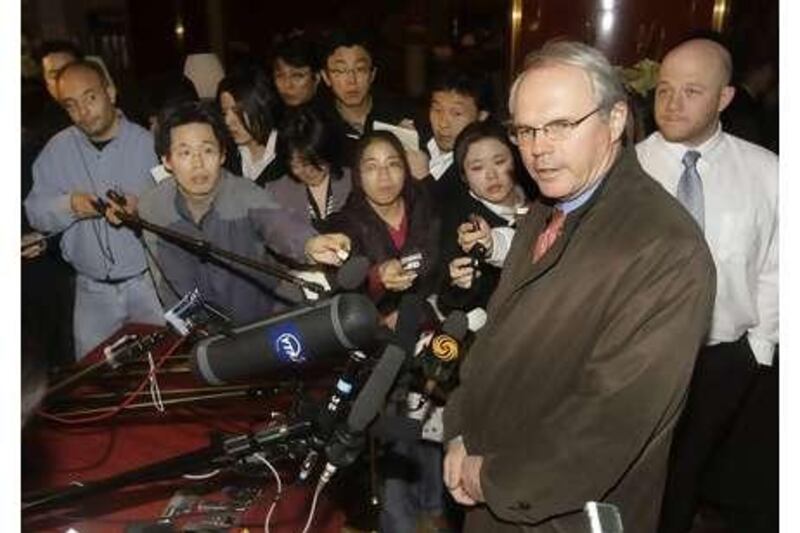BEIJING// "The nuclear talks didn't achieve anything and frankly I don't have anything to write about. Could you tell me something newsworthy?" a reporter asked Kim Sook, the South Korean chief nuclear negotiator, at a press conference on Thursday night in the Chinese capital. It was the day when North Korea ended the latest round of China-hosted nuclear disarmament talks, by refusing to agree on a verification protocol for nuclear sampling endorsed by the five countries - China, South Korea, the US, Russia and Japan -involved in the talks.
A few hours earlier, Christopher Hill, Washington's frontman on North Korea, told reporters: "The North Koreans don't want to put into writing what they are willing to put into words." Essentially, his statement reflects the curse of "creative ambiguity". Creative ambiguity is a diplomatic parlance, referring to the practice of deliberately leaving room for different interpretations and not to paper over differences, but instead to keep the negotiation momentum going while focusing on the big picture. Unfortunately, the creative ambiguity manifested itself over the controversy of the nuclear sampling matter on which North Korea and the US both claim they have the truthful understanding of it. More unfortunately, it was this very ambiguity and the resultant difference that ultimately torpedoed the negotiation.
It all started when Mr Hill visited Pyongyang from Oct 1 to Oct 3. He came out with a "deal". Based on that "deal", the state department on Oct 11 announced that North Korea had agreed to "scientific procedures" that inspectors would use to determine the extent and history of North Korea's nuclear activities, such as "sampling" and "forensic activities". The state department, however, did not release details of that document where the deal was specified because there was none. It was verbally agreed to, Mr Hill said. One day later, on Oct 12, North Korea's foreign ministry issued a statement, refuting the US announcement. "The verification methodologies are limited to site visits, document checks and interviews with engineers." The North rejected the US version of the inclusion of "sampling".
Essentially, North Koreans were saying they had not agreed to the sampling from the beginning, while the US was saying the North Koreans had agreed. Professor Lee Dong-ryul of Dongduk Women's University in Seoul said: "North Korea is a smaller and weaker nation compared to the US and its interest lies more in gaining the maximum possible concessions rather than adhering to a principle." Prof Lee's comment reflects the prevalent view that doubts the veracity of North Korea statement, seeing North Korea relapsing into the bad habit of denial, if not brinkmanship.
Yet some observers such as Chung Wook-sik, head of the Civil Network for a Peaceful Korea, a non-governmental organisation in Seoul, believe it may have been Mr Hill who put the wording "sampling" into the Oct 11 state department announcement, which was not part of what had been agreed in Pyongyang. Mr Hill's motivation was partly to placate the Washington hardliners, who would be very upset about the lack of a concrete verification procedure after the US removed North Korea from the list of countries that sponsor terrorism. Mr Hill was also partly confident he could work out the sampling issue eventually by having additional consultations with the North Koreans, the argument goes. On Nov 6, Mr Hill met Li Gun, director general of the North Korean foreign ministry's American Affairs Bureau, and the two "discussed the verification protocol" among other things, according to Robert Wood, the state department spokesman. Mr Li also told South Korea's JoongAng Daily he and Mr Hill had "extensive discussions" on verification steps. Mr Chung argued this was an indication the deal was not agreed to by the two as North Korea and the US had a lot to work on. It was not clear what the two sides agreed to or whether they ever came to an agreement on nuclear sampling. But it is clear that the wording of "sampling" was apparently not included in the deal he and the North Koreans made earlier in Pyongyang, giving weight to Mr Chung's argument.
Evidence backing Mr Chung's view comes also from the answer to a parliamentary hearing on Nov 4 by Yu Myung-hwan, the South Korean foreign minister. When pressed by Yoon Sang-hyun, a lawmaker with the ruling Grand National Party, to confirm that the confidential agreement between North Korea and the US in Pyongyang included the term "scientific procedures" but did not include the term "sampling", Mr Yu answered "Yes". Cheon Seong-whun of the Korea Institute for National Unification, a government think tank in Seoul, said: "My hunch is that Hill must have mentioned the issue of sampling in Pyongyang. The US has had many experiences of negotiating arms reduction with other countries. So, it is hard to believe that the issue was not addressed. "It was likely that North Korea initially refused. But after Hill's persistence, it may have given an ambiguous oral agreement," Cheon said. But the repeated inquiries on the matter by reporters at the press conference indicated some needed further clarifications. "I heard what North Korea and the US said their respective understanding of what they think they agreed when they met," Seoul's chief envoy said. "I wasn't there [in Pyongyang], but from where I see, North Korea was trying to make things as ambiguous as possible, while the US was trying to regard what the two verbally agreed as the same as what they could agree in a written form." After the press conference in Beijing on Thursday the truth game still remained unresolved. Creative ambiguity has transformed into sterile ambiguity. slee@thenational.ae





